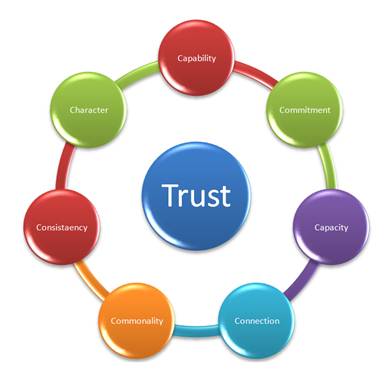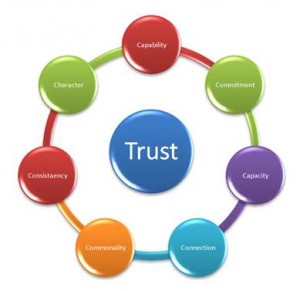
by Madeleine | Sep 10, 2015 | Positive Relationships
 I’m reminded of the song by Tina Turner…
I’m reminded of the song by Tina Turner…
”What’s love got to do with it” …”What’s love but a second hand emotion,” …”Who needs a heart when a heart can be broken.”
Trust is fundamental to all relationships and we often use past experiences and information to guide us on whether to trust or not. If our past relationships have been positive, confidence and trust remain high. The opposite is also true because once trust has been shattered it’s a gradual process of rebuilding our self esteem, confidence and trust. The answer isn’t to build a fortress, rather to be selective about the company we keep. There’s that saying of “You have to give a little to get a little” and so it is with trust, learning from the positive and negative feedback that you receive. Consider your own family of origin and ‘the marriage script’ as a good starting point in building positive (or troubled) relationships.
With this in mind it’s time to look at how we can trust after we’ve been hurt in love and matters of the heart.
- What were the warning signs ? – Learning from the past.
Were there lies, broken promises, manipulative and malicious
traits, aggression, mood swings, substance abuse, violence, jealousy?
- Don’t assume the future will be the same as the past.
Fear of trusting again because you may be hurt in love has it’s own name…
Pistanthrophobia. Carrying around baggage called “pistanthrophobia” is pretty off putting in itself, and will ruin any chances of being in a positive and emotionally satisfying relationship. One sound piece of advice by a therapist was “Don’t cast aspersions on the entire female/male population because of one bad experience with one bad girl/guy.” Unless a person has done something to warrant us being wary of trusting them, they deserve to be given an open-minded chance. The clean slate approach comes to mind rather than being poisoned by past experiences.
- What were the things you could have done differently?
Looking back, an important lesson is to trust your instincts. If something didn’t seem right then it probably wasn’t. Address your fears rather than dismissing them. By making better decisions it will become much easier to trust someone new.
- It’s OK to be vulnerable.
Becoming hardened to life and it’s pleasures is to deny yourself the fundamental rights to a good life. If you go into a relationship with the view that it probably won’t work or the person is likely to leave you, then you are setting yourself up for failure. We are all vulnerable when we open up our selves to others – that is a part of life and the growth experience. ‘Find comfort in the discomfort that is uncertainty and vulnerability.’
- Time out! – Give yourself time to heal.
After a difficult relationship break-up, it’s extremely important to take timeout from the dating scene and allow yourself time to grow in your pain. Learn everything you can from your previous relationship(s) so that when you do venture out again you are able to start afresh and be more informed.
A relationship with no trust is like a cell phone with no service, all you do is play games.
- Show yourself some self-compassion so that you can be your best.
Before we can be our best in a relationship, we need to be at peace with ourselves and be the best we can be…to be comfortable in our own skin and in our own company. If we rely on another person to validate who we are before we consider ourselves whole, it is time to reflect on our sense of self and take responsibility for discovering our unique qualities and what we can bring to a relationship.
- Sweet revenge is in living well.
The natural tendency is to set up barriers and to protect ourselves by refusing to remain open and to trust again. An ex’s untrustworthiness does not have to have a permanent impact on your ability to trust, or form new relationships. “Pain is inevitable; suffering is optional.”
- You can never have total certainty.
Life is full of risks and uncertainties. Nothing someone says or does in the current moment can guarantee the future, and as long as you fear the pain/hurt/rejection that comes with detachment, you will have “trust issues.”
- Being Present/Mindfulness.
By staying present in your relationships you will alleviate some of the ‘trust issues.’ It is natural to ask yourself the ‘what ifs’ but remaining focused on the here and now will help reduce the degrees of anxiety and uncertainty. It’s a matter of enjoying yourself now rather than being distracted by the fear of an ultimate betrayal in the future of your relationship.
- Communication is the name of the game.
It’s fatal to assume. If you want to know someone then you need to communicate, ask questions, enquire into their history, likes, dislikes, passions. The early stages is when you find you will be ascertaining whether this person shares the important elements/codes of conduct that life requires; and that there is a solid foundation for a future together. Use open questions beginning with… who, what, when, where, how – rather than the yes/no responses given to closed questions. Healthy couples don’t avoid conflict, but know how to keep the lines of communication open.
- ‘Slow down you’re moving too fast…’
Take your time in getting to know the person you’re interested in. You are both investing yourselves in this relationship, so enjoy this journey. Meet each other’s friends, family, and socialize together. Make the experiences enjoyable, honest and fun. Rid yourself of distractions during your time with that special someone – turn off phones/mobiles, tablets and laptops.
- Remember the small things.
Saying please and thank you are important and should be practised at all times. Manners matter! Niceties will go a long way to maintaining a culture of mutual respect.
- Eat, Live, Laugh.
Eating is a bonding ritual for families and couples; a time to connect and receive nourishment, both physical and spiritual. A time for sharing of ideas and views and to explore the lighter side of life.
- Practice sensuality and then sexuality.
The early stages of a relationship require greater sensuality than sexuality. It’s a time of mystery, intrigue and fascination with each other. Why rush? The complications associated with leaping too quickly into a sexual relationship are too numerous to mention.
- Give each other space to grow.
While there may be the urge to rush into a live-in relationship, this often happens far too soon. Again, take your time, get to know each other, and if you both agree that it’s time to take it to the next level of commitment then discuss it with the view to establishing a time frame around this mutually agreed decision.
- To make relationships work requires team work.
If you are looking at sharing a home together, recognise that each must contribute towards the responsibilities associated with running a household. Swap roles – alternate your home duties – cooking, cleaning, shopping, and gardening. Remember the saying…”Happy wife, happy life.” No one likes being stuck in a rut. It’s true that you must give what you want to get in return.
- Arguments stem from our own fears.
Women and men are not from Venus or Mars. We are unique – individuals trying to make our way in a complex world. Understanding and celebrating our differences will make living together more interesting, fun and peaceful.
We all come with personal baggage and our own life experiences – good and not so good. When upset occurs, do a personal check on what’s going on inside of you, rather than getting angry with your partner. So often the reason for the fight that upsets us isn’t the real problem but rather ‘the straw that broke the camel’s back.’ Often we experience concurrent stressors that lead to anxiety, frustration and anger
GIVE but don’t allow yourself to be used
LOVE but don’t allow your heart to be abused
TRUST but don’t be naïve
LISTEN to others but don’t lose your voice
- You can only change yourself, not your partner.
The very worst reason for coming together is the notion that we can change the other person. Not so! For change to occur it must be clearly articulated (the need) and accepted by both parties. The question is…”Whose needs are being met?”
- Emotional responsibility.
This is the most important ingredient for creating a healthy relationship. When people do not take responsibility for their feelings, they tend to try making their partner responsible for their own happiness, self worth and emotional safety. Self worth comes from how we treat ourselves and others.
- Walk a mile in my shoes.
Relationships thrive when both partners are kind, accepting, compassionate and empathetic. When you can be all these things to yourself then you can convey this to those you love. In a healthy relationship there needs to be connection and also room for autonomy – room to grow.

by Madeleine | Apr 22, 2015 | Positive Relationships
 Having positive, supportive and loving relationships based on mutual respect will ensure we feel happier and healthier in our lives and enhance how we connect to others in our community and society generally.
Having positive, supportive and loving relationships based on mutual respect will ensure we feel happier and healthier in our lives and enhance how we connect to others in our community and society generally.
“The way people treat you is a statement about who they are as a human being.
It is not a statement about you.”
1. Check out the relationship you have with yourself.
If you have a healthy, positive relationship with yourself (positive regard)
then you are more likely to form happy and secure relationships. Trust is an important factor in any relationship. If you can trust yourself then you can trust in others to bring about a productive relationship. This is not for the faint hearted and requires courage to take a chance.
2. A positive relationship is good for you.
People in loving and supportive relationships are more likely to be happier, healthier and satisfied with their lives. Positive relationships ensure good mental health and less risk-taking behaviours.
3. Listen first, talk second.
Being a good listener is absolutely essential, and it is a rare commodity in our society. Active listening makes a person feel supported, valued and respected. You wouldn’t expect less yourself, so practice positive listening skills with others.
Active listening involves understanding what a person is feeling, thinking, wanting, and meaning through their words and expressions. By restating or paraphrasing we are ‘checking in’ that we are following their line of thought and discussion.
4. Time is a precious gift.
The luxury of sitting down and talking to someone, person to person, needs to be recognised as very special in this time of social media ie. twitter, emails, facebook etc. Connecting with friends, colleagues and loved ones needs to be fostered and nurtured beyond computers, laptops and phone messages. Make time to catch up and nourish friendships.
5. Assume nothing.
Developing relationships is about keeping an open mind, checking in and ensuring that we haven’t misunderstood what has been said or the reason behind a person’s actions. Being genuine in our interactions will help us minimise any misunderstandings.
6. Empathy vs sympathy.
Sympathy essentially implies a feeling of recognition of another’s suffering while empathy is actually sharing another’s suffering and having the ability to “put yourself into another’s shoes.” The worst thing that can happen in any relationship (or in the formation stage) is insincerity. Pity has no place in a personal relationship.
7. Information and mobile technology.
There is an important place for technology in our lives. However, it is a form of communication that should be used with discretion. Nothing can take the place of human contact and interaction. Technology should be an aid in the communication process but never take the place of face to face engagement.
8. Embrace and celebrate differences.
The challenge in the formation of friendships is acceptance of differences. How we perceive the world may be very different to how others view it.
Each of us brings our own perceptions, experiences, culture and social practices into relationships. The joy of sharing this with others ensures that we continue to review our understanding of the world and the people in it.
The world would indeed be dull if we all thought and acted the same.
9. What are the ingredients for a positive relationship?
- Respect
- Honesty
- Trust
- Friendship
- Mutual emotional support
- Encouragement
- Understanding social and cultural differences
- Room for individual expression
- Equity in gender differences
10. Relationships breathe.
All relationships are real, living, breathing organisms. They come into being for a certain time and evolve. For a positive relationship to grow it needs to be nourished. To ensure that the balance of nutrients (ingredients) is right it is a good idea to review them periodically.
11. Relationships are about having fun.
Having fun is part of a positive relationship. You should be enjoying your time with one another. Do ‘mix it up’ in your activities together. There’s so much to be enjoyed out in the world; new activities, experiences, sights. Broaden your horizons together.
12. Authenticity and speaking Your Truth.
As mentioned previously, the differences we each bring to a relationship needs to be honoured and recognised. If we live our truth, our ‘differences’ will be viewed as a natural, positive extension of ourselves (our authentic self).
13. Being vulnerable is OK.
We all have times where we have doubts and feel vulnerable. That’s OK and there is nothing to fear. Being vulnerable means being open and showing our inner thoughts, feelings, beliefs and being less than perfect. For a positive relationship to grow there needs to be room to explore and grow. Sure, there is the risk factor associated with disclosure but the rewards can be huge. Often, by giving voice to our vulnerability the flood gates are open for others to do the same. We give permission for others to share their concerns and vulnerabilities too.
14. Honour yourself and others.
To honour someone and what they are sharing with us we need to…listen closely, be understanding, empathise and respond sincerely. Clarify if uncertain to ensure misunderstandings are minimised.
15. It’s all in the eyes.
Great communicators and positive relationships recognise the importance of eye contact. There is nothing more flattering and warming than to have someone’s undivided attention; as though their eyes are only on you. There is one exception to this rule and that is to recognise cultural differences. In some cultures eye contact is avoided and considered rude or disrespectful. Distracting gestures should be minimised such as fidgeting, glancing at papers, tapping fingers and feet. Have you noticed how many people sit at tables with friends/partners and spend their time checking messages on their mobile phones? A real relationship killer if ever there was one.
16. Room to forgive and forget.
Relationships will have their highs and lows as with anything in life. Friends do not let misunderstandings and arguments stand in their way. It is worthwhile fostering tolerance, forgiveness and understanding. To be able to wipe the slate clean, knowing that a person’s intention was not to cause pain.
At times what we say and what we mean can be misconstrued. We may also forget an appointment to meet. Remember that we are all human with our own foibles and dramas.
17. Loyalty
In positive relationships loyalty solidifies rather than divides. Rarely is there gossiping, spitefulness, and back-biting. Respecting confidentiality and standing by friends is a gift that is priceless.
18. Don’t let the sun set on disagreements
If a fall out or misunderstanding occurs, it’s best to address the issue as soon as is practicable. A nice way of approaching the matter is to start with a positive, then express concern about the misunderstanding, and finish with a positive once again. It’s often referred to as ‘the sandwich’ approach.
19. Everyone likes to talk about themselves and hear their name.
If wishing to encourage a new relationship, it’s good to use a person’s name and also to engage in ‘open ended’ questions/lines of enquiry. Open questions promote conversation thus avoiding yes/no replies. For example, use who, what, when, where, how in your discussion.
20. Relax and enjoy the experience.
People who observe us can pick up signs about our health or stress levels from our faces and bodies; they read signals about our social status from our environment, and they gauge us according to the skills and social interactions we exhibit across a number of situations we face every day. Like it or not, our personalities leave behind clues to who we are in each of these sectors.
By relaxing and smiling we are setting the scene in a positive light.
“The meeting of two personalities is like the contact
of two chemical substances: if there is any reaction,
both are transformed.” – C.G. Jung

by Madeleine | Apr 20, 2015 | Positive Relationships
 So often the books and articles available to us address the things that go wrong in marriages/partnerships. By focusing on the strengths and possibilities in promoting relationships, the emphasis here is on positives rather than the litany of omissions.
So often the books and articles available to us address the things that go wrong in marriages/partnerships. By focusing on the strengths and possibilities in promoting relationships, the emphasis here is on positives rather than the litany of omissions.
- A solid friendship is essential.
A solid friendship based on respect, clear communication and teamwork is the foundation stone of a quality relationship.
- Have I told you lately that I love you?
In a happy marriage/partnership it’s important to let your partner know that they are special, valued and not being taken for granted. This affirmation should be shown through words and actions. It’s those little things like the unexpected hug, saying “I love you” every day, hanging out the washing, or even putting on the kettle for a cup of tea or coffee. The key is giving consistent affirmation rather than reserving it for a special occasion. It’s not the big extravagant shows of affection but the little, daily acknowledgements that matter.
- Keep your expectations real.
When a partner’s expectations go unmet frustration sets in. The one important factor is to ensure that the expectations we have of one another are realistic. How can we ensure our expectations are achievable? By talking to each other. Expectations may cover treatment of the other, conflict resolution, finances, division of home duties, child rearing. My husband had this humorous notice stuck to the door of his office….D.A.D.E.D.B.D. ie. Don’t Ask, Don’t Expect, Don’t Be Disappointed. Although he was clearly creating boundaries in relation to work demands, this seriously could be fine tweaked to apply equally to positive relationships. Don’t Ask? Don’t Expect, Don’t Be Disappointed. After all, none of us are mind readers.
- Are we bored yet?
Even in the best marriages/partnerships there is the chance of boredom happening. To reduce this likelihood keep things fresh, introduce change. By this I mean exploring new places, restaurants, new ideas and activities together. Through doing new things together the arousal/adrenaline it produces is transferred into your relationship.
- Communication – It’s complicated.
For healthy and fulfilling relationships good communication is essential. Double checking to see what your partner is saying can be useful. Keep your communication open and clear by seeking clarification to avoid misunderstandings. To communicate effectively set aside time without interruptions and talk about what is happening and how this affects each of you.
- Check in with emotions.
As part of effective communications/relationships it is important to check in with your emotions. If there is an emotional topic of concern use of statements commencing with “I feel” help to tap into how this is affecting you. A strategy would be to commence with a positive comment, followed by the ‘I feel’ statement and ending with a positive conclusion. In other words use the sandwich technique in discussions of the heart – a positive followed by an honest critique of your emotional feelings and ending with a positive. Character assassinations, accusations, name calling should be avoided.
- Challenges rather than problems.
In a relationship you don’t necessarily solve problems. However, you can work together and manage the challenges that arise. Honesty is needed to ensure that the best outcomes can be negotiated.
- Life is what happens when you’re busy making other plans.
As relationships progress, change in inevitable. Some of the changes may be planned, for example, children, employment, housing etc. However, there are also the unforseen such as illness, disability, unemployment, work demands, financial pressures and retirement. Positive relationships recognise that life’s demands will happen and relationships change. By being open and communicating, preparing for the unexpected, you have a better than average chance of weathering the storms. You need to have a plan if only to be clear on what will occur under these circumstances. The rose coloured glasses need to be set aside for a ‘reality check.’ Being flexible and resilient will ensure some stumbling blocks are minimised.
- Time together and time alone.
There needs to be a balance between togetherness and separateness. A positive couple will share some hobbies and interests together, and then make time to pursue their own private sporting, cultural and artistic endeavours.
- There’s a conflict coming on.
In strong marriages/relationships both partners understand each other’s positions, feel comfortable sharing their feelings and ideas. Disagreements are taken seriously, and both partners work together cooperatively to address issues of conflict. Conflict resolution skills are vital. Make the time to investigate, learn and practice conflict resolution strategies.
“Building a healthy marriage means that you have learned to turn your stumbling blocks into stepping stones. Build on your strengths, while creatively addressing your differences.” – D.H. Olson
- Let’s get sexual, sensual…
With life’s demands so many people and couples for that matter find that there just isn’t any energy at the end of the day to enjoy a sexual relationship. While we can all empathise, there’s a wonderful alternative. By simply being sensual, both partners feel loved and validated. Enjoy those special moments of intimacy, touching, hugging, kissing, sharing thoughts with the other, lost in the wonder of each other. Creativity must be used to ensure that the experience is pleasurable for the other. Respecting each other and recognising that stress and exhaustion are so often a part of life and need to be dealt with sensitively. Create opportunities for intimacy and practice patience.
- Falling in love again. What am I to do?
There needs to be the understanding that falling in love is not the same as being in love. There is a transition period from the initial throes of first love to the more mature, evolving love in marriage and partnerships. The stages can be seen as …1. Coming together (initiating stage), 2. Experimentation (finding common ground), 3. Intensifying stage (self disclosure, testing the waters), 4. Integration (couple exclusivity), and 5. Bonding (the relationship commitment which includes power equality, constructive communication, and connection with each other). …Knapp’s Relational Development Model.
- I’m listening
It goes without saying that happy couples and partners are good listeners. This means that your focus is entirely on your partner with comfortable eye contact being maintained (where culturally appropriate). There is no ‘butting in’ while the other is talking; posture is relaxed with a non-defensive body position, no distracting gestures, and phones/communication devices are muted. Above all you need to be genuinely interested rather than distracted.
- Trust me
An essential quality in building an intimate relationship is…trust. If there is no trust we cannot open our hearts to anyone. If we honour the agreements and boundaries, share our thoughts, feelings and vulnerabilities, then trust will be an essential part of a positive, nurturing relationship.
- Being vulnerable
To open ourselves up to being vulnerable means that we expose the inner most thoughts and feelings about ourselves to another person. There is nothing to fear in being vulnerable. By showing our true worth and opening our hearts we acknowledge our humanity. It is also a way of allowing us to heal by releasing our hurt and anguish. By being honest we also give permission to our partner to do the same.
“We’re never so vulnerable than when we trust someone – but paradoxically, if we cannot trust, neither can we find love or joy.” – F. Crane
- Speak your own truth.
The differences that are brought into a relationship need to be recognised, celebrated and honoured. In a fulfilling, intimate and positive marriage (or partnership) couples are absolutely truthful in matters of the heart. By withholding your truth you create a distance between yourself and your partner. Make it a ritual to share your truth with your partner, express your feelings to clear out any unresolved pain, but also share your dreams, fantasies, hopes and expectations. By doing this you take responsibility for your actions and the direction of your life as a person of integrity and a caring partner.
- Power through responsibility.
By claiming responsibility for our experiences and actions we claim the power to create our own unique direction in relationships. If we acknowledge our part in positive or struggling relationships we are able to move on to the challenges of righting the wrongs and making our relationships stronger. This is not about blame because blame is the antithesis of responsibility. By blaming we project our feelings onto an innocent party (our partner) rather than addressing our feelings which are often based on experiences in our past. In doing this we may temporarily deflect our attention off our pain but do not allow healing to occur or end the cycle of pain .
- I’m an individual.
There is the contradiction in desires – unity (a sense of oneness) and individuality (the sense of difference). In fact both need to be embraced for a healthy, positive relationship. Self care is necessary because if you can’t care for yourself you won’t be able to care about/for anyone else. Giving freely of your love, compassion and happiness will be reflected in your relationships. Without these elements a relationship will slowly wither and die. As with any endeavour there needs to be planning. Make a list of personal goals that you wish to attain. The areas that should be covered include… career, hobbies, recreation, physical/psychological fitness, diet, ongoing personal growth education, artistic interests, and spirituality to name but a few. Your partner should also complete a list of personal goals. By comparing your lists you may be surprised by what you discover about each other.
- Having fun.
Being in a marriage or partnership should include having fun. Without fun it would be a pretty boring relationship. Make the time to enjoy your time together. Try to laugh every day and foster humour. Talk about some fun things you would like to do together. See funny movies, read funny books and hunt out positive quotes. Finally, enjoy social gatherings with positive, fun loving like-minded friends.
- Spirituality is a component of positive relationships.
As suggested in ancient Buddhist teachings, by transforming our relationships into spiritual relationships, a light is shone on the deeper meanings of marriage and partnerships. In spiritual relationships there is a place for kindness, wisdom and compassionate partnering. In other words there is a commitment to something higher; to become your best self in a better relationship which promotes co-creative interactions. The intentions, meaning and purpose of life take you exactly where you both want to go. This commitment to each other is the foundation of spiritual growth. A conscious, loving and enduring relationship fosters flexibility, loving detachment, mutual respect and compassion. The goal is to live in an unshakable awareness of and willingness to embrace the light and darkness present in all relationships.
“Whatever relationships you have attracted in your life at this moment, are precisely the ones you need in your life at the moment. There is a hidden meaning behind all events, and this hidden meaning is serving your own evolution.” – Deepak Chopra

 I’m reminded of the song by Tina Turner…
I’m reminded of the song by Tina Turner…







